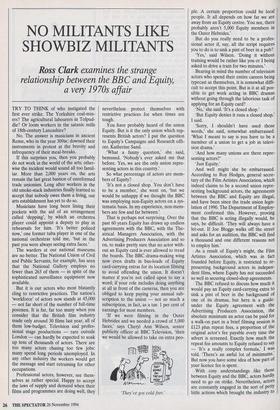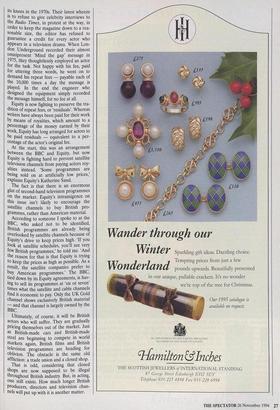NO MILITANTS LIKE SHOWBIZ MILITANTS
Ross Clark examines the strange relationship between the BBC and Equity,
a very 1970s affair
TRY TO THINK of who instigated the first ever strike. The Yorkshire coal-min- ers? The agricultural labourers in To!pud- dle? Or loom workers in the satanic mills of 18th-century Lancashire?
No. The answer is musicians in ancient Rome, who in the year 309Bc downed their instruments in protest at the brevity and infrequency of their meal-breaks.
If this surprises you, then you probably do not work in the world of the arts; other- wise the incident would sound all too famil- iar. More than 2,000 years on, the arts remain the last great bastion of unreformed trade unionism. Long after workers in the old smoke-stack industries finally learned to accept that nobody owes them a living, our arts establishment has yet to do so.
Musicians have long been lining their pockets with the aid of an arrangement called 'clepping', by which an orchestra player could appoint a deputy to play in rehearsals for him. 'It's better policed now,' one former tuba player in one of the national orchestras told me, 'but in the past you were always seeing extra faces.'
The warders at our national museums are no better. The National Union of Civil and Public Servants, for example, has seen that the National Gallery employs no fewer than 263 of them — in spite of the sophisticated surveillance equipment now available.
But it is our actors who most blatantly cling to restrictive practices. The nation's `workforce' of actors now stands at 45,000 — not far short of the number of full-time postmen. It is far, far too many when you consider that the British film industry made only around 30 films last year, all of them low-budget. Television and profes- sional stage productions — rare outside London — can hardly be expected to soak up tens of thousands of actors. There are too many actors chasing too few jobs: many spend long periods unemployed. In any other industry the workers would get the message and start retraining for other occupations.
Professional actors, however, see them- selves as rather special. Happy to accept the laws of supply and demand when their films and programmes are doing well, they nevertheless protect themselves with restrictive practices for when times are tough.
You have probably heard of the union Equity. But is it the only union which rep- resents British actors? I put the question to Equity's Campaigns and Research offi- cer, Katherine Sand.
'What a funny question,' she said, bemused. 'Nobody's ever asked me that before. Yes, we are the only union repre- senting actors in this country.'
So what percentage of actors are mem- bers of Equity?
`It's not a closed shop. You don't have to be a member,' she went on, 'but we would be unhappy if we thought the BBC was employing non-Equity actors on a sys- tematic basis. In my experience, non-mem- bers are few and far between.'
That is perhaps not surprising. Over the past 60 years Equity has drawn up endless agreements with the BBC, with the The- atrical Managers Association, with the Advertising Producers Association and so on, to make pretty sure that no actor with- out an Equity card is ever allowed to tread the boards. The BBC drama-making wing now even drafts in bus-loads of Equity card-carrying extras for its location filming to avoid offending the union. It doesn't matter if you're not called upon to say a word; if your role includes doing anything at all in front of the cameras, then you are obliged to keep paying your annual sub- scription to the union — not so much a subscription, in fact, as a tax: 1 per cent of earnings for most members.
`If we were filming in the Outer Hebrides and we needed a crowd of 5,000 faces,' says Cheryl Ann Wilson, senior publicity officer at BBC Television, 'then we would be allowed to take on extra peo- `They've got cold feet.' ple. A certain proportion could be local people. It all depends on how far we are away from an Equity centre. You see, there probably aren't 5,000 Equity members in the Outer Hebrides.'
But do you really need to be a profes- sional actor if, say, all the script requires you to do is to sink a pint of beer in a pub?
`Yes,' said Wilson. 'Doing it without training would be rather like you or I being asked to drive a train for two minutes.'
Bearing in mind the number of television actors who spend their entire careers being typecast as themselves, it is somewhat diffi- cult to accept this point. But is it at all pos- sible to get work acting in BBC dramas without going through the laborious task of applying for an Equity card?
`No,' she said. 'It's a closed shop.'
`But Equity denies it runs a closed shop,' I said.
`Sorry, I shouldn't have used those words,' she said, somewhat embarrassed. `What I meant to say is you have to be a member of a union to get a job in televi- sion drama.'
`And how many unions are there repre- senting actors?'
`Just Equity.'
And well might she be embarrassed. According to Roy Hodges, general secre- tary of the Film Artistes Association, which indeed claims to be a second union repre- senting background actors, the agreements between the BBC and Equity are illegal, and have been since the trade union legis- lation of 1990. The Department of Employ- ment confirmed this. However, proving that the BBC is acting illegally would, he says, be difficult. 'They will always have a let-out. If Joe Bloggs walks off the street and asks for an audition, the BBC will find a thousand and one different reasons not to employ him.'
As a result of Equity's might, the Film Artistes Association, which was in fact founded before Equity, is restricted to re- presenting background actors in indepen- dent films, where Equity has not succeeded so well in securing closed-shop agreements. The BBC refused to discuss how much it would pay an Equity card-carrying extra to sink a pint of beer in the background of one of its dramas, but here is a guide: under the Equity agreement with the Advertising Producers Association, the absolute minimum an actor can be paid for a walk-on part in a brief filming session is £123 plus repeat fees, a proportion of the original actor's fee payable every time the advert is screened. Exactly how much the repeat fee amounts to Equity refused to say — 'It's a really complex formula,' I was told. 'There's an awful lot of minimums. But now you have some idea of how part of your licence fee is spent. With cosy understandings like those between Equity and the BBC, actors hardly need to go on strike. Nevertheless, actors are constantly engaged in the sort of petty little actions which brought the industry to its knees in the 1970s. Their latest wheeze is to refuse to give celebrity interviews to the Radio Times, in protest at the way, in order to keep the magazine down to a rea- sonable size, the editor has refused to guarantee a credit for every actor who appears in a television drama. When Lon- don Underground recorded their almost omnipresent 'Mind the gap' message in 1975, they thoughtlessly employed an actor for the task. Not happy with his fee, paid for uttering three words, he went on to demand his repeat fees — payable each of the 10,000 times a day the message is played. In the end the engineer who designed the equipment simply recorded the message himself, for no fee at all.
Equity is now fighting to preserve the tra- dition of repeat fees, or 'residuals'. Whereas writers have always been paid for their work by means of royalties, which amount to a percentage of the money earned by their work, Equity has long arranged for actors to be paid residuals — equivalent to a per- centage of the actor's original fee. At the start, this was an arrangement between the BBC and Equity, but now Equity is fighting hard to prevent satellite television channels from paying actors roy- alties instead. 'Some programmes are being sold on at artificially low prices,' explains Equity's Katherine Sand. The fact is that there is an enormous glut of second-hand television programmes on the market. Equity's intransigence on this issue isn't likely to encourage the satellite channels to buy British pro- grammes, rather than American material.
According to someone I spoke to at the BBC, who asked not to be identified, British programmes are already being overlooked by satellite channels because of Equity's drive to keep prices high. 'If you look at satellite schedules, you'll see very few British programmes,' he told me. 'And the reason for that is that Equity is trying to keep the prices as high as possible. As a result, the satellite companies prefer to buy American programmes.' The BBC, tied down by its Equity agreements, is hav- ing to sell its programmes at 'six or seven' times what the satellite and cable channels find it economic to pay. Only the UK Gold channel shows exclusively British material — and that channel is largely owned by the BBC.
Ultimately, of course, it will be British actors who will suffer. They are gradually pricing themselves out of the market. Just as British-made cars and British-made steel are beginning to compete in world markets again, British films and British television programmes are heading for oblivion. The obstacle is the same old affliction: a trade union and a closed shop.
That is odd, considering that closed shops are now supposed to be illegal throughout British industry. But, in acting, One still exists. How much longer British producers, directors and television chan- nels will put up with it is another matter.











































































 Previous page
Previous page